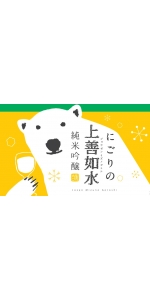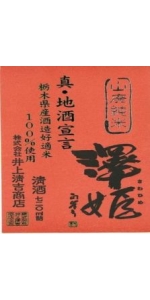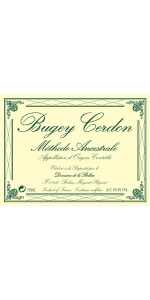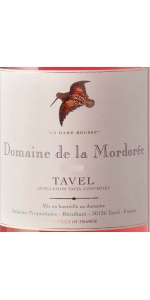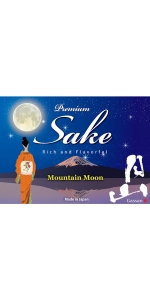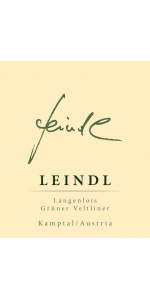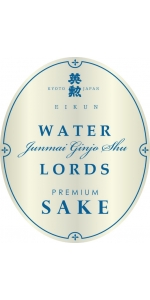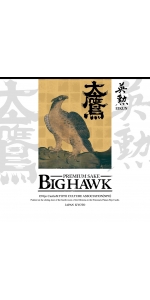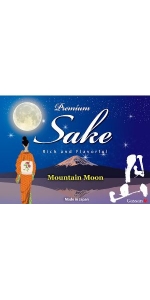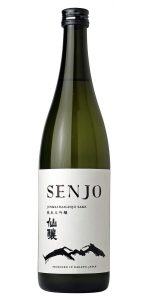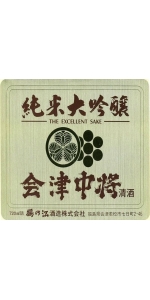Sake Eikun Junmai Ginjo Water Lords (720ml)
6 bottles with free shipping for: $180.00
12 bottles with free shipping for: $312.00
| BUY MORE! SAVE MORE! | ||||||||||||||||||||
|
| Country: | Japan |
| Region: | Kyoto |
| Winery: | Water Lords (Eikun) |
| Grape Type: | Gohyakumankoku (Sake) |
| Vintage: | NV |
| Bottle Size: | 720 ml |
Sake Eikun Junmai Ginjo Water Lords is made with Iwai rice.
Eikun sake uses water from a source called "Fusui", rated as one of the top 100 sources of water in Japan. This water source is located just south of the ancient Japanese, and still cultural capital of Japan, Kyoto.
Aromas of macadamia oatmeal cookie, spicy zucchini bread, and vanilla cream with a satiny fruity-yet-dry medium-to-full body and a layered, banana custard, jicama, salted whole nut, apple, and radish nuanced finish. A Wonderfully vibrant and flavorful sake.-Beverage Tasting Institute 94 points (Exceptional)
RATING: 94 points (Exceptional)
CATEGORY: Junmai Ginjo Sake, Sake
ALCOHOL BY VOLUME: 15.3%
TASTING LOCATION: In Our Chicago Tasting Room
TASTING DATE: Dec-05-2012
WINE ID: 200768
Water Lords (Eikun)
Saito Shuzo Co. Ltd.
The Water Lords (Eikun) Brewery
Eikun, also known as Saito Shuzo Co. LTD., founded in 1895, is located in the Fushimi region of Kyoto Japan

In 1905 during the Taisho period in Japanese history, the "EIKUN" sake was adopted as the company's corporate brand name. Since then, the finest quality sake has been produced by Saito Sake Brewer known as "EIKUN" which is acknowledge today as the finest Sake produced in the Fushimi district of Japan famously known to sake lover for its premium brewed sake.
Over the years, the company has become a leader in the sake industry and the pioneer for the development of quality premium sake in Japan.
ushimi region is home to 30+ other breweries due to the quality of its water source. This soft water plays an instrumental part in creating smooth and balanced sake. With its moderate climate and beautiful natural surrounding in Kyoto greatly contributes to the delicate and quality taste of Saito Sake and captures the essence of premium sake quality at its best.
The major sake production areas in Japan are:
- Kobe – Nada-GÅgo largest area of sake production
- Kyoto (Fushimi) – home to the big brewery and museum of Gekkeikan + 30 other breweries or Kura, too.
- Niigata – largest number of Kura at 90+
- Akita – northern sake region called Tohoku
Sake Rice and Water
Unique to the region of Kyoto is Iwai rice which is only used by Kyoto sake producers. In fact, Eikun purchases 40% of all Iwai rice produced.
Eikun sake uses water from a source called "Fusui", rated as one of the top 100 sources of water in Japan. This water source is located just south of the ancient Japanese, and still cultural capital of Japan, Kyoto.
Food and Sake in Kyoto
Kyoto is home to many Shinto shrines and a particular type of cuisine called Kaiseki. Kaiseki is a sequence of small and artistically arranged dishes, both beautiful in presentation and flavor.
"Kaiseki" in Kyoto cuisine is all about "Dashi (broth)" and it’s "Umami". So the taste of food is elegant, and they don't usually put a lot of soy sauce or salt in Kyoto cuisine.
Therefore, the sake flavor is kind of gentle and soft to match with local Kyoto cuisine.
This western area of Japan around Kyoto blends sake and culture into a perfect marriage.
Eikun Sake isn’t just known at the consumers market level, but it is also very well received at traditional high end Japanese restaurants though out Japan where people come to enjoy the traditional taste of Japanese cuisine and to enjoy the unique experience of Eikun Sake.
Best of the Best Sake
Each year since the 1890’s there is a competition "Shinshu Kanpyou-Kai" (National New Sake Competition) now called National Competition, which judges sake quality. Eikun has received the gold medal for their sake an unprecedented 14 years in a row.
Only 20-25% of all Kura receive gold medals each year.
In addition, no Kura or brewery has received the award 14 times consecutively. The National Competition is attended by 90% of all 1300 Kura in Japan and is for Daiginjo grade products only.
About Kyoto
The City of Kyoto was founded as "Heiankyo" in 794 A.D. It flourished as the capital of Japan for approximately 1,000 years and was the birth site of the quintessential Japanese culture and traditions one finds throughout the country today.
Even after the transfer of the capital to Tokyo during the Meiji Restoration in 1868, Kyoto maintained its position as Japan's cultural capital. It is home of various national treasures worthy of global pride as well as many historical buildings and traditional arts and crafts. Kyoto's rich and colorful history, combined with its geographic and climatic factors have created a city with a very unique blend of tradition, culture, and industry. Kyoto was laid out in a grid pattern with the Imperial Palace located at its center.
Inviting aromas of mint, marshmallow and Asian pear pull you into this drink. Surprisingly dry, this Nigori (cloudy) style sake has a rich, chewy texture. The intriguing mid palate features mint, white chocolate, and tart cherries. The finish belies our expectations with an elegant, softness of minerals that settles in a dry finish.
Pair with roast duck, dry-rub ribs, full flavored country pate, and fruit and nut desserts of light sweetness.
Mildly ripe Coulommiers or Brie, Italian Raschera.
From the Tochigi Prefecture.
This sake has aromas of gardenia, ripe kiwi, papaya, green peppercorn, aged comte cheese and notes of nutmeg, mushroom, toasted oat and yeast. This sake is bright, dry and lively with medium plus acidity, and full bodied on the palate with a long finish.
Rice Koji: Hitogokochi
Rice Kake: Hitogokochi
Yeast Strain: KT-901
FOOD PAIRINGS: Smoked or oily fish, fried Calamari and Fish Tempura, Fried Chicken
CHEESE PAIRINGS: Foggy morning, slight ripe Brie, Raschera
Beliere Bugey-Cerdon is made from 95% Gamay, 5% Poulsard (a local grape from Jura).
Spontaneous fermentation. An altogether preferable scenario to spontaneous combustion, and A LOT more fun to drink. This pink, semi-dry bubbly was made by spontaneous fermentation, otherwise known as methode ancestrale. Grapes are picked by hand (not just any grapes, these are the local Poulsard and Gamay grown on mountainous slopes in the shadow of the Alps), and fermented in chilled vats just reaching 5 or 6 degrees alcohol. The young and light wine is then bottled, along with its active yeast and considerable unfermented sugars. Under pressure of the cork, the wine continues to ferment, gaining a few degrees of alcohol but retaining a nice amount of sweetness. The bubbles, of course, are another result of fermentation under pressure. This one is so delicious and fun to drink, with a distinctly, well, grapy aroma and a fruitiness that calls out for celebration and jubilation.
This is also wonderful served with chocolate cake!
8% ABV.
Produced from the "Ancestral method" (also used to produce Clairette de Die): Low temperature fermentation starting in the tank, light filtration that leaves active yeast in the wine, bottling of the wine with fermentation continuing in the bottle ("spontaneous fermentation in the bottle"), retaining some sugar (40 gr/liter at the end). Made from 95% Gamay, 5% Poulsard (a local grape from Jura).
Review:
"Amber color. Aromas and flavors of cranberry juice, rose petal, cherry and kiwi, and red apple with a round, bright, effervescent, fruity medium-to-full body and a delightful, medium-long finish that shows nuances of cherry, cranberry, beeswax, and rose water. Concentrated fruit flavors, creamy bubbles, and well balanced acidity will make this a splendid pairing with charcuterie." - Beverage Testing -Institute (November 2022), 92 pts - Gold Medal
Mordoree Tavel Rose Dame Rousse is made from Grenache 60 %, Cinsault 10%, Syrah 10 %, Mourvèdre 10%, Clairette 5%, and Bourboulenc 5%.
Nose : steady rose, brilliant and limpid.
Aromas : very complex with flowers, red and white fruits aromas.
Palate : rounded, full bodied with a long lasting aniseed and fruity finish.
Ageing potential : 4 to 6 years
Surface : 9 Ha. Yield : 44 Hl./Ha. Vineyard age : 40 years Terroir : Clay / chalk and sandy with pebble stones. Harvest : by hand Vinification : 100% destemming, cold maceration during 48 h., pneumatic pressing, fermentation at 18° C. Estate bottle
Food pairing: cold meat and delicatessen, poultry, white meats, grilled meats, fried fish, fish soup, pastas, pizzas and all Asian cuisine.
Review:
"Pale watermelon in color, this wine is composed of 60% Grenache, 15% Cinsault, 15% Syrah and 10% Clairette. It has a focused nose of ripe watermelon, cherry skin, blueberry, violets and wild herbs. While the wine has plenty of structure for additional cellaring, enjoy it now with a creamy goat cheese."
- Wine Enthusiast (September 2023), 92 pts
Woodsy honeycomb, nutshell, and mushroom patch aromas with a satiny fruity-yet-dry medium-to-full body and a delicate savory mushroom stock, chestnut, and golden beet driven finish. A fine choice for tempura. 91 Points -Beverage Tasting Institute
RATING: 91 points (Exceptional)
CATEGORY: Junmai Ginjo Sake, Sake
ALCOHOL BY VOLUME: 15.4%
TASTING LOCATION: In Our Chicago Tasting Room
TASTING DATE: Dec-05-2012
WINE ID: 200767
Leindl Gruner Veltliner Langenlois is made from 100 percent Gruner Veltliner.
This classic Gruner Veltliner comes from the famous wine-growing region of Langenlois. A very typical fruity and fresh Gruner Veltliner offering green apples, juicy, minerality, a pleasant body and a good length. It is ideal with a wide range of dishes.
Cold Fermentation.
Aged on the lees for 6 months in Stainless Steel tank. No Oak. No ML.
Produced from vines of 5-20 years old on slate soils.
Sake Eikun Junmai Ginjo Water Lords 12/720ml is made with Iwai rice.
Eikun sake uses water from a source called "Fusui", rated as one of the top 100 sources of water in Japan. This water source is located just south of the ancient Japanese, and still cultural capital of Japan, Kyoto.
Aromas of macadamia oatmeal cookie, spicy zucchini bread, and vanilla cream with a satiny fruity-yet-dry medium-to-full body and a layered, banana custard, jicama, salted whole nut, apple, and radish nuanced finish. A Wonderfully vibrant and flavorful sake.-Beverage Tasting Institute 94 points (Exceptional)
RATING: 94 points (Exceptional)
CATEGORY: Junmai Ginjo Sake, Sake
ALCOHOL BY VOLUME: 15.3%
TASTING LOCATION: In Our Chicago Tasting Room
TASTING DATE: Dec-05-2012
WINE ID: 200768
Made with Iwai rice.
Eikun sake uses water from a source called "Fusui", rated as one of the top 100 sources of water in Japan. This water source is located just south of the ancient Japanese, and still cultural capital of Japan, Kyoto.
Rice milling: 60%
Rice milling: 60%
Rice varietal: Iwai (Only available in Kyoto)
Alcohol: 15%
Sake meter value: +3.0
Acidity: 1.3
Tasting Notes: --------
Eikun sake uses water from a source called "Fusui", rated as one of the top 100 sources of water in Japan. This water source is located just south of the ancient Japanese, and still cultural capital of Japan, Kyoto.
Review:
"Clear with a platinum blue cast. Aromas of coconut milk, melon, pear and rice pudding with a with a supple, dry-yet-fruity medium body and a vanilla, apple, and pepper accented finish. A robust and lively sake that will sing with spicy Asian cuisine."
- Beverage Testing Institute (July 2nd 2014), 91 pts
Woodsy honeycomb, nutshell, and mushroom patch aromas with a satiny fruity-yet-dry medium-to-full body and a delicate savory mushroom stock, chestnut, and golden beet driven finish. A fine choice for tempura. 91 Points -Beverage Tasting Institute
RATING: 91 points (Exceptional)
CATEGORY: Junmai Ginjo Sake, Sake
ALCOHOL BY VOLUME: 15.4%
TASTING LOCATION: In Our Chicago Tasting Room
TASTING DATE: Dec-05-2012
WINE ID: 200767
Juicy & Refreshing. Full of fruity flavors with clean sweetness. Brewed with Hitogokochi, the special sake rice harvested in Nagano, and natural water slowly filtered down the Japan Alps. In 1866, toward the end of the Edo period, Matsujirou Kurogouchi and his family started a small sake brewery currently called Senjo named after Senjo Ga Take, a 3000-meter peak in the Japanese Alps. Today Senjo Brewery strives to combine art with science and old skill with new technology by adding modern twits to the rich historical traditions of Sake brewing.
Pair with Deep-fried fish with sweet & sour sauce, Young sweetfish tempura (chiayu tempura), Caesar salad.
This Junmai Daiginjo has a beautiful nose full of banana, melon and star anise. The all natural brewing process gives this sake a bright fresh palate of plum, lime and minerality with a clean dry finish. A very food friendly sake, and is thought to be best after the meal with a light, smooth, rich cow's milk cheese.
POLISHING RATIO: 40%
ALCOHOL: 16-17%
SMV +/-: +1.0
ACIDITY: 1.2
RICE KOJI: HATTANISHIKI
RICE KAKE: HATTANISHIKI
YEAST STRAIN: PROPRIETARY YEAST
FOOD PAIRINGS: Poached Lobster, Seared Scallops, Tofu, Steamed Dumplings
CHEESE PAIRINGS: Brillat Savarin, Cambozola, Dulce Latte Gorgonzola, Mimolette
Woodsy honeycomb, nutshell, and mushroom patch aromas with a satiny fruity-yet-dry medium-to-full body and a delicate savory mushroom stock, chestnut, and golden beet driven finish. A fine choice for tempura. 91 Points -Beverage Tasting Institute
RATING: 91 points (Exceptional)
CATEGORY: Junmai Ginjo Sake, Sake
ALCOHOL BY VOLUME: 15.4%
TASTING LOCATION: In Our Chicago Tasting Room
TASTING DATE: Dec-05-2012
WINE ID: 200767
- back
All older vintage wines have been purchased from a single collectors cellar. Pictures can be requested before shipment.
This vineyard is situated at over 3,000 feet in altitude in Valle de Uco, and the vines are over seventy years old. This light soil is sandy with some silt, is very permeable and has boulders and a broken layer of limestone at a depth of 2.5 feet. Traditional irrigation is fed by water from the Andes Mountains. Temis has the coldest climate of all Alta Vista’s terroirs. Nights are quite cool and days are warm and soft, with constant breezes that help to keep the vines and grapes healthy. The grapes have a slow, gradual cycle of ripeness that is balanced and ideal. Planted in 1942, the selection massale vines are characterized by small clusters with small, compact grapes.
Review:
There’s a touch of bark, grilled Mediterranean spice savoriness to the rich but fresh blackberries, salted black plums and graphite notes. Pretty saline and flavorful on the palate. The tannins are powerful yet fine-grained. A structured and characterful malbec from old vines in El Cepillo.
-James Suckling 94 Points


